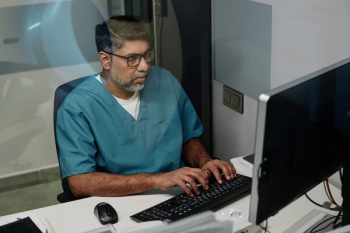
Out of Shape, Getting In
Getting back into the swing – with exercise or image reading – will likely be tough after COVID-19.
Longer-term readers may recall that I’m a strong believer in the value of a maintained exercise regimen. There are any number of reasons as to why, not the least of which being an improved state of health. (One hopes that people don’t need a medical degree to know this.)
Holding such beliefs and acting on them are two very different things. Although I can trace my fitness career over 30 years into the past, there have been intervals when I was less than adherent to it. I’ve thus gotten familiar with the experience of getting back into the swing of things after lapses.
Shades of “no pain, no gain,” my body protests when I exert it in ways not recently familiar. The promptness with which it kvetches informs me as to just how much my recent lapse has cost me in terms of conditioning. Being stiff and sore two days after exercise means I’m only a little deconditioned, and I’ll will be back at full form soon. Pain the day after exercise is worse. I’ve got some serious ground to recover. Pain the same day means I probably overdid it and injured something.
This physical penance has a fitting harshness to it: I failed to respond to internal mental stimuli (“Gosh, I’ve been slacking on my exercise for a few days/weeks. I should really get back on the stick.”), so a more tangible reminder is called for.
The same mechanism results in punishment when circumstances require strenuous activity that differs from the norm, even when I’ve been a good boy with my routine and imagine myself to be at my personal best. More than once, for instance, I’ve found that shoveling out my driveway after a snowstorm bears little practical resemblance to what I’ve been doing in the gym. My body thanks me for the suddenly new demands I’ve put on it with exquisite aches and pains for the next while -- just as intense as if I had skipped a year of my usual exercise routine and suddenly jumped right back into it at full force.
This goes for mental activities, as well as physical ones. The mind has appropriately been compared to a muscle, complete with “use it or lose it” adaptation. Pertaining to diagnostic imaging, I can recall multiple instances of getting back from a vacation (or different clinical rotations, during residency) and needing a little while to regain my radiological footing.
I suspect a lot of us who have been furloughed during the pandemic will need to shake the dust off of our skills when we once again have work to do. Even those lucky enough to have retained most or all of their working hours will probably have gotten accustomed to anemic worklists and will have to re-adapt to productively and efficiently reading cases rather than idly plucking a lone CXR when one turns up, in-between checking the news for the gazillionth time of the day.
Society, as a whole, is also undergoing a harsh re-acquaintance with concepts of epidemiology, infection-control, and overall emergency resource management -- not to mention routine aspects of daily living that have gone off the rails. I actually found myself feeling less adept behind the wheel of my SUV the other day, what with not having driven much in the past month.
Really, when’s the last time we had to deal with something on this scale? It’s probably inapt to compare to someone getting back into the gym after a prolonged absence, since many people now alive had no concept of this to begin with. This might be more like someone who was never really in shape, getting drafted into boot camp.
One possible upside: as painful and humbling as it’s sometimes been for me to get back into my fitness regimen after slacking off, in the fullness of time I’ve noticed that such circumstances have resulted in overall personal growth. At times of prolonged adherence, I eventually reach a plateau in terms of what I can do and how much it taxes me to do so. Subsequent lapses and returns to my routine, more often than not, break through such plateaus, ultimately leaving me operating at a higher level than I ever did before. A particularly gratifying turn of events, since this has occurred over a course of decades, I would have expected aging to result in a trend of the opposite direction.
Some room for hope, then, that the stormy circumstances of this viral mess might ultimately leave us more capable than before as individuals, radiologically speaking or otherwise, and as a society perhaps more robust for the next Big Bad Thing that comes our way.
Newsletter
Stay at the forefront of radiology with the Diagnostic Imaging newsletter, delivering the latest news, clinical insights, and imaging advancements for today’s radiologists.












